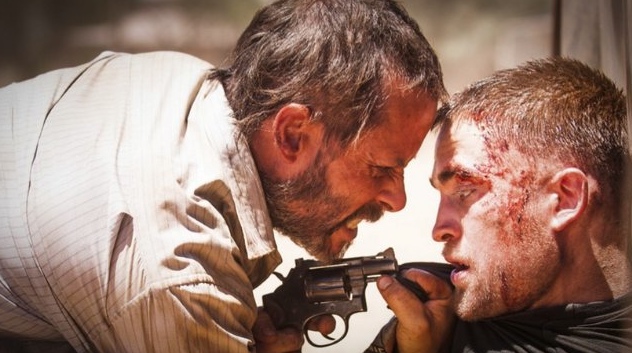CHICAGO – Excelsior! Comic book legend Stan Lee’s famous exclamation puts a fine point on the third and final play of Mark Pracht’s FOUR COLOR TRILOGY, “The House of Ideas,” presented by and staged at City Lit Theater in Chicago’s Edgewater neighborhood. For tickets/details, click HOUSE OF IDEAS.
Impulsive, Curious Tale of Dystopia in ‘The Rover’
 Rating: 3.0/5.0 |
CHICAGO –There is a profound interest in impulse within the work of Australian filmmaker David Michod, whose number of features finally reaches two with his anticipated followup to “Animal Kingdom,” “The Rover.” Even his co-writing work for Joseph Gordon-Levitt’s life-crasher movie “Hesher” is indicative of a storytelling force jazzed by that which is abrupt and unexplainable, and without worry of how polarizing these weirdo choices may be. With “Animal Kingdom” providing superb testament to his potential for straight dramatic tension through performance, Michod now meanders towards the more oblique territory of “Hesher” with “The Rover,” an impressionistic assembly of questions that reach their finite answers with impulsive expressions.
For his second film, director David Michod returns to the hot Australian landscape, but to a world more damaged than a crime family’s home. The title cards say “Ten years after the collapse,” and while the initial collapse is not shown, one can see its remnants in the quiet territory that makes for “The Rover’s” stage. Guy Pearce plays Eric, a stone-face loner in a now very hostile world who travels cautiously. When his car is stolen with some mystery item important still in it, he makes it his life priority to recover the truck. By chance, he meets up with a young man named Rey (Robert Pattinson), who was abandoned by his brother Henry (Scoot McNairy), the ruffian who also helped steal Eric’s mobile. As Eric and Rey make haste to catch up with Henry and his men, they encounter various depths of optimism and pessimism about mankind’s potential for existence, outside of a society of order.

The Rover
Photo credit: A24 Films
Poetically, Pearce’s introduction evokes the stoic first chapter of “Once Upon a Time in the West,” with characters who are so statuesque that bugs freely whiz around their nostrils. Fitting then, that his fierce work in “The Rover” recalls some of his unhinged action in another Aussie western that he stars in, “The Proposition.” Playing a flesh-and-blood character who embodies an adaptation to such a ruthless, spare environment, Pearce lets his facial expressions do most of the talking. A scene in the beginning involving him wordlessly provoking the men who have stolen his car, by tailing them casually and then silently driving up next to them, shows the rich hellfire that boils within him.
Pattinson continues to provide proof of his range, even in this role where he plays someone that Billy Bob Thornton in Sling Blade would sympathize with as a “poor little feller.” By no coincidence, this is because Pattinson seems to be harping on Thornton’s version of podunk American, a southern character with his own pitiful innocence. Pattinson borders between slandering an entire region of our country and providing an entirely ugly character with his own profound emotional journey. But his performance with this character is what grounds this fictional being, with his eyes that wander in anxiety, expressing a sincere sense of shame.

The Rover
Photo credit: A24 Films
Contrasting its exhaling long takes and various vista shots of a multicolored magic hour sky, “The Rover’s” most wild aesthetic element is its audible experience. Not to be fooled by its tumbleweed setting, Michod’s film roars when characters are racing in their cars, or when cold-blooded gun shots are fired. The musical atmosphere itself is also an intriguingly amorphous one, with Antony Partos score refusing to settle on instruments, tones, or rhythms as it progresses from scene-to-scene creating its own inescapable chaos. Similar to how Michod used Air Supply with serious sarcasm in “Animal Kingdom,” he blares a sassy Keri Hilson song (in which she sings about her name) while the camera captures environmental despair. The effect is as striking as it is confounding.
A constantly unexpected journey, “The Rover” has many strange stops, each of which it arrives at very slowly, with a lot of downtime in between. Overall, emptiness is the main fuel of Michod’s post-apocalyptic vision. It is meant to enhance the mystery of the lives of its characters, their intentions, and their perspectives on a world where the concept of laws have no meaning anymore. But as much as certain interactions may ring in memory after the film is viewed, there’s just not enough of the active fascination within this emptiness to create the thorough tension that this movie desires. The simplicity of Pearce’s goal to get his car back is an intriguing hook, but the manner in which this film ruminates on itself leaves a bit more to be desired from its desolate experience.
 | By NICK ALLEN |


